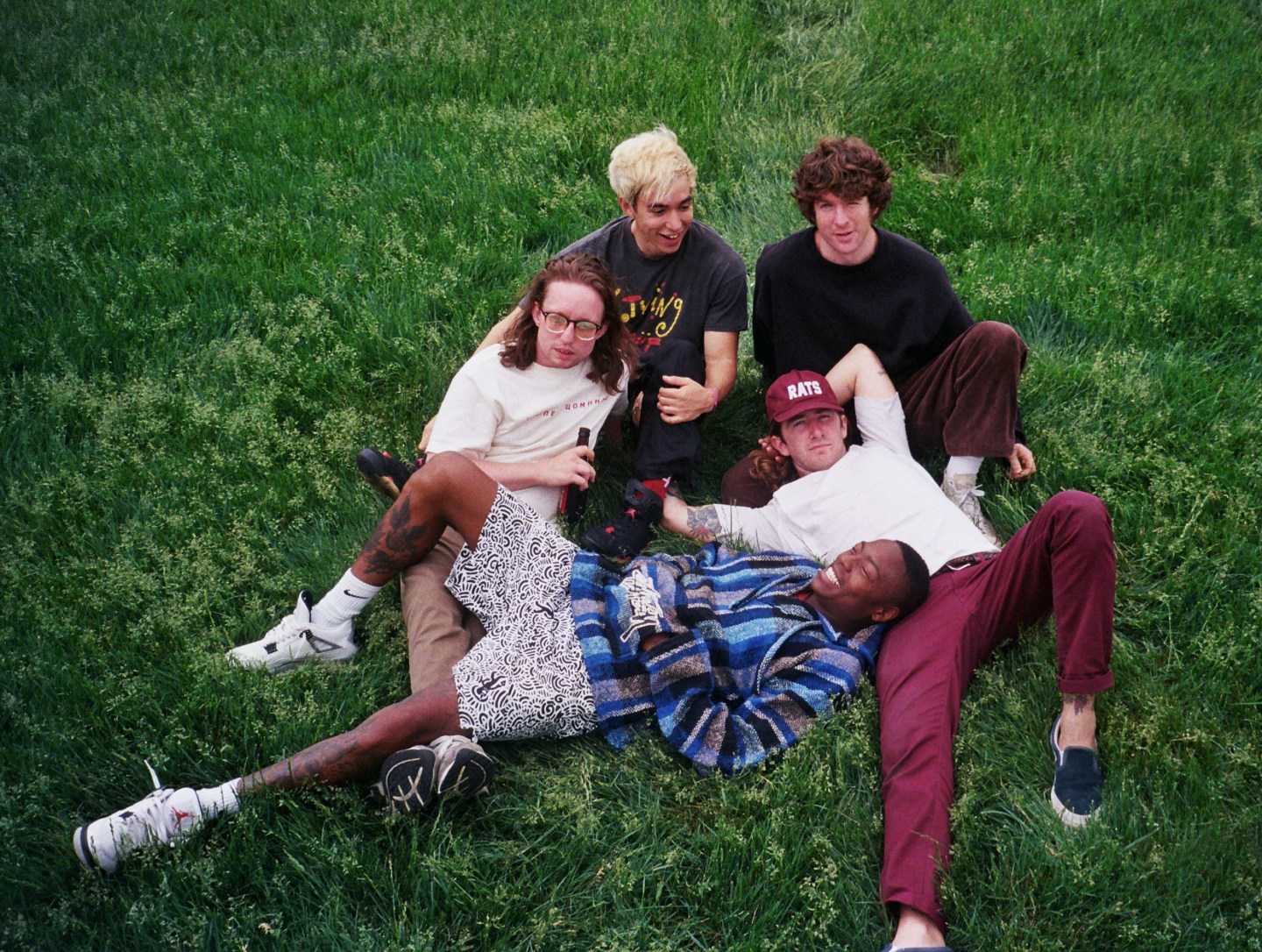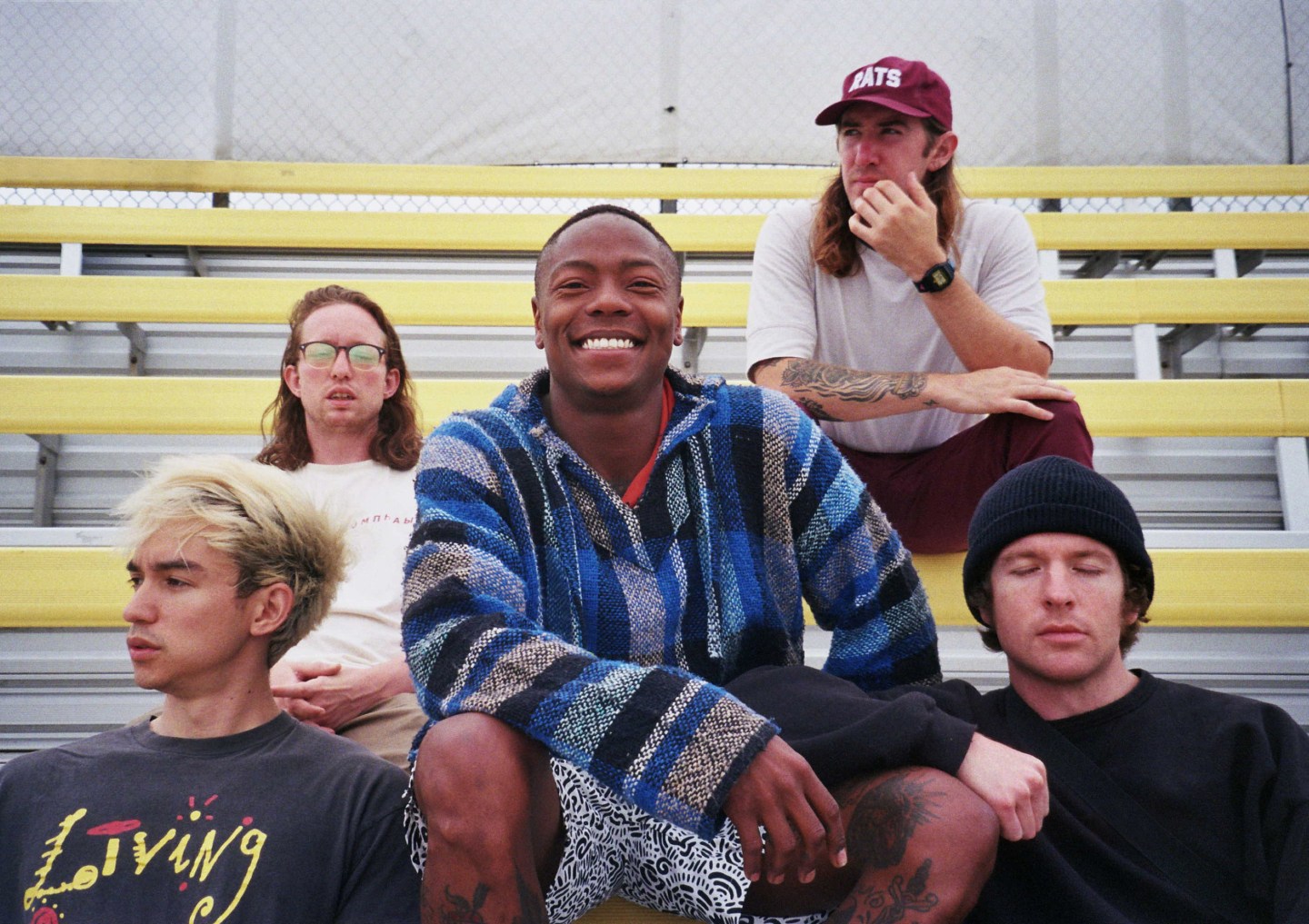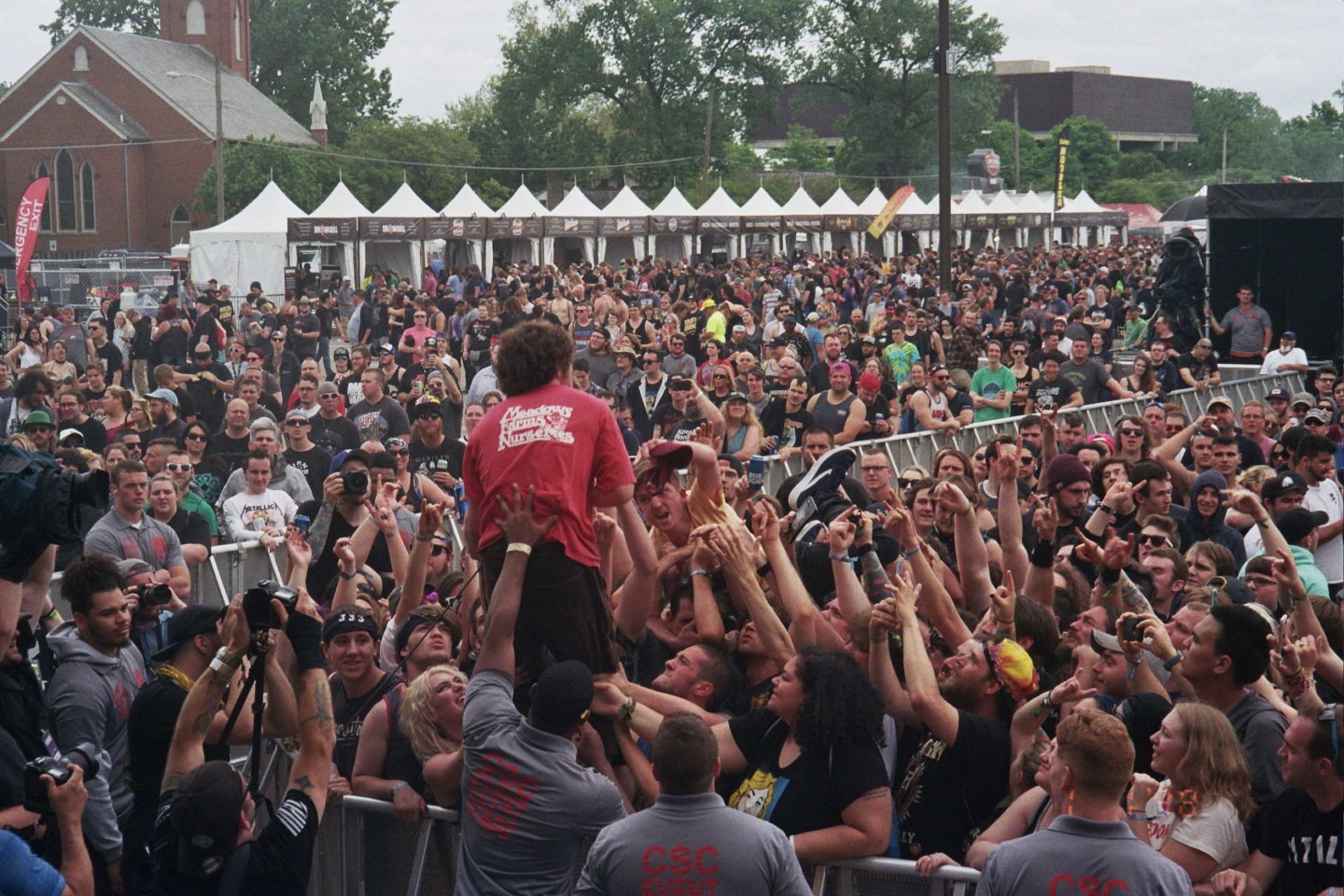 Turnstile
Turnstile
Listening to Turnstile feels like laying into a turnt up trust fall. On their visceral songs, the Maryland band broadens the scope of what hardcore can be, leaning deeply into groovy, melody-driven structures. It’s this tendency to follow their hearts musically, combined with their friend-created merch, immersive videos, and welcoming show environments, that’s creating a global network of listeners who are encouraged to be themselves — a community that builds on the foundations of the D.C. and Baltimore scenes that members Daniel Fang and Brendan Yates, both 28, came up in themselves.
Early this summer, I caught up with Fang and Yates over the phone as they drove from Ottawa to Toronto during the international leg of a tour in support of their new album, Time & Space. The band members — drummer Fang and frontman Yates, bassist Franz Lyons, and guitarists Pat McCrory and Brady Ebert — share the aux while on the road, listening to everything from Beyoncé to Beach House to Ariana Grande (“Break Free” is one of Fang’s favorite songs to drum to) to the newest record from Seattle band Big Bite. After talking for a while about growing up in Maryland, the scenes they came up in, and the artists they’re influenced by, it becomes clear that their eclectic approach to car tunes sort of mirrors their broader musical ethos.

Did you guys grow up in musical families?
DANIEL FANG: My family was the least musical family ever. I only heard music sometimes, from easy listening radio while my dad was working from home. None of my family members played instruments. Sometimes when my mom was in a really good mood, she'd listened to Aretha Franklin or Sam Cooke, but other than that I didn't listen to music until my brother found punk rock CDs when he was in middle school, and I was in elementary school. The punk rock thing started from there.
BRENDAN YATES: My parents weren't ever really into music and no one in my family played instruments or anything. But my older sister, she liked music, like rock and punk and rap, and made me mixes. She's the one that turned me on to alternative music, other than stuff I would hear on the radio.
Where exactly in Maryland did you guys grow up, and what was it like?
DANIEL: I'm from a place called Birdsville, Maryland, 10 minutes from D.C. and 20 minutes from Baltimore. It was cool. As a kid I was playing in the woods a lot, but also skating and going to the city.
BRENDAN: It's actually remarkably similar because I grew up in a place called Greenbelt, [Maryland] which is also a suburb outside of D.C. — a half an hour from Brendan but pretty similar. It was suburban but very close to two big cities that had really active hardcore punk scenes. We grew up going to a lot of the same shows and then eventually, we went to the same Maryland university, Towson University, which two other members of Turnstile went to as well. We all got a lot closer and were a lot more involved in the Baltimore hardcore scene.
The suburbs in that area are pretty diverse, and the region’s hardcore scenes are pretty active. Did you see that diversity reflected in the scene as you were growing up?
BRENDAN: The older I get, the more I think about how fortunate me and a lot of people in our area are to grow up going to a public school and experiencing so much cultural, religious, and ethnic diversity, because that kind of exposure is so important to getting a special insight into the world that you can't really get otherwise. You can't grow up in the middle of the country [without] that exposure and be able to learn things about people, and acceptance, and tolerance.
I think the history, of at least the D.C. hardcore scene, is so oriented around specific bands that were really hinged on being very diverse in terms of having non-white members and drawing influences from… like, Bad Brains drawing influences from reggae and dub, and Minor Threat coming up with the ethos of straight edge and the importance of thinking as an individual. I think all those things are perpetuated in the whole Maryland hardcore punk community. Also, in our experience, the shows have always been a little bit more diverse than maybe in other parts of the country. I'm sure in more ways than one, that kind of diversity that we experienced and the people we've grown up with has been mirrored in the scene and [we are] definitely fortunate to have that.
DANIEL: It's definitely a cool thing to have that in your music scene, to be able to start different kinds of bands and have different kinds of bands play together. Because that's the kind of thing that brings people together. I think it will open up a platform for people to be a part of.

Turnstile’s been pretty great about making live shows a welcoming and safe space. If a band was trying to do the same for their own shows, what would you suggest to them?
BRENDAN: I think to start, maybe, [having] different bands playing together. Different ways of thinking, different walks of life come to the show for each respective band that people are coming to see. It'll create an open environment, where people come and go, “Oh, it's cool that this band is playing with this band. I like this band now, and I like these people that I met at the show,” that kind of stuff. That's a starting point.
DANIEL: That's a really big part of it, especially when we do our headliner tours and have the opportunities to ask a bunch of friends’ bands that we're all fans of [to play with us]. Having a lineup that is diverse definitely takes away some boundaries of expectations of what you're supposed to come to the show and dress like, how you're supposed to dance to the music. When there's that kind of diversity, I think that, off top, gets rid of a lot of standards of what people think they're supposed to do. It opens everyone's mind a little bit. It fosters the idea of you're just there to have a good time and to maybe experience something new, which is, I think, always a very fresh energy to have at any show.
With our friends playing the show, the energy of all the bands is really positive and warm, and I think that somehow reflects [in the room], even though people in the room may not know that [the bands are friends]. Everyone's smiling and very excited to introduce the next band that's on because everyone is genuinely excited about everything that's happening that night. I think Brendan does a great job not really inciting anything at the shows that's violent or crazy. If there are people getting squished up front or someone's getting repeatedly stomped on when people are stage diving, Franz [Lyons] and Brendan and other people in the band will stop what they're doing mid-song and ask them if they're okay, or offer to bring them up on stage if that's a safer and more comfortable environment for them.
The kind of sonic boundary-pushing that happens on your new album Time & Space is so awesome. That kind of genre-bending is happening in other genres, like country and rap. Who are some boundary-pushers in other genres that you guys are inspired by or fans of?
DANIEL: I’ve always been a fan of Frank Ocean and Tyler, the Creator and their general circle, and the way they push things in the rap and R&B worlds. I think Beach House is kind of in a world of their own where they've always pushed their unique and cool sound upon a dream pop world.
BRENDAN: I've always liked Grimes a lot. She's a super underrated producer. I feel like a lot of her music, especially earlier, was oriented around her making beats with a bunch of synthesizers on the floor. Then, she started singing over it. She turned into a little bit more pop-oriented artist. I've always really loved the beats she makes. And her style is very eccentric and cool, and something I've enjoyed visually and artistically. Her whole style is very oriented around the DIY thing. She does it all so well, from directing her music videos to creating this album art that's somehow perfectly cohesive with the freaky music that she makes.


Earlier this year, Maryland-based skate brand Carpet Company did some boards and shirts for you guys, and I know your recent tour tees were designed by Julian Consuegras of Stray Rats. What’s the story behind working with those guys?
BRENDAN: I grew up skating with the Carpet Company guys. They still live five minutes from me, so I just went over to their house and we printed a hundred or so shirts and spent some time together in their basement.They've always been an inspiring force for me. They've always been very self-motivated and creative, always very excited about creating things and super hard-working. That's the kind of stuff I think makes me excited, not necessarily working with the biggest name in the game. If you're going to make something and you're to work with someone else, let it be someone that truly inspires you.
Same with Julian [of Stray Rats]. He's been a friend for such a long time.. He pretty much organized the merch spreads for the last tour. I think [working with people you’re inspired by] makes the whole experience a lot more special and it makes you a lot more connected to what you're doing. Like recording with [producer] Will Yip. It's not about recording with the biggest record producer that you could find when you Googled, or the biggest name on the scene. He’s a great friend and also a cool, creative person that's so inspired and inspiring to us, and he’s working with a collective of bands that are different sonically. If he's going to be working on something, he truly believes in it and wants to make it the best possible and lets it consume him.
It’s the same thing with merch and recording. It should be a real connection to real people that inspire you. That's kind of like everything we do — trying to achieve and make something special together.
That sense of community and building something together definitely emanates from Turnstile. I feel like the music, in combination with the live shows, merch, art, and videos — it's creating a special universe for young people who are into a lot of different things and sounds, who thrive to be themselves. You mentioned Grimes as someone who’s able to do this too, but were there people or artists you looked up to or admired when you were younger, who created their own worlds through their music?
DANIEL: I think one person and a particular band, at least for me, and for a lot of people in Maryland, that is pretty important is Justice [Tripp] of [the band] Trapped Under Ice. I think, when you grow up in a hardcore punk community, it's kind of daunting and scary going to shows sometimes where people are moshing and there's a lot of aggressive energy. It can be scary for a skinny, teenage kid to just go to a show, especially if you don't know people, or you don't have a lot of friends.
I think there were a handful of people in Baltimore and D.C. scenes that made a particular effort to welcome young kids into the scene and make conversation, or invite these young kids’ bands to play shows and just feel like they belong in a community, and feel confident enough to start creating and to share an idea. Trapped Under Ice, which Brendan later joined, was a really important band to me because they were all a little bit older and started playing a lot of shows and invited bands that I played in to play shows with them and to come hang out. That may seem like a really small, mundane thing, to just kind of be welcomed at a show, but I think it really makes a world of difference in the long run, by giving young people the confidence and the security to come into their own. I think that's the single biggest thing, other than just idolizing artists from around the world or from decades ago. Just having people in your community and having your peers support each other, and really foster something from the ground up.
A lot of Turnstile’s songs touch on feelings of anxiety or pain, loss or frustration, which have allowed for safe spaces for people to freely be like, It’s normal and OK to feel these ways sometimes. I think creating that room for people to explore those feelings in a positive way is really important.
DANIEL: I feel very fortunate that a lot of us found music at a young age and people to share it with, because I think when kids are growing up and experiencing all those things at a very formative age, you choose how you deal with it, and that kind of sets a pattern for the rest of your lives.
It's so normal for people to feel anxiety or depression or frustration or isolation or ostracization from the peers group they grew up in, their family or society as a whole, or whatever. It’s so important to find an outlet that is healthy and cathartic, instead of resorting to some kind of violence or substance abuse.
 Brendan Yates
Brendan Yates
 Brendan Yates
Brendan Yates
I read a quote about how Roadrunner A&R Cody Verdecias came across y'all through rap, but I heard of you guys through the skate world.
BRENDAN: Franz [Lyons] was brought up skating. I grew up skating. If we weren’t skating every single day, most of us have grown up around it. I've met a lot of cool friends, like I said I met Ayman and Osama [of Carpet Company] through skateboarding, and a lot of my hometown friends when I'm home, I’ll skate with them. It's also cool now, being in a band and traveling and being able to bring your board on tour and skate around different cities and see spots that you would see in [skate] videos. It's always been an important part [of the band] and I think it’s connected to music, too. It's always been a way that we've discovered music — from skate videos and skate video games. Everything is very connected.
Going back to producer Will Yip — he’s a legend! How was working with him different from production on your previous projects? In what ways did he push you guys creatively?
BRENDAN: He is very special to work with. Like I said before, he’s very inspiring and fully submits 100 percent to what he's doing. He very much so brings out the best possible performance of everyone. Dan recorded the same drum song hundreds of times, it felt like. The first song was about one minute, but Dan was in there bleeding and sweating for days on days. Have you seen the movie Whiplash before? It was kind of like that. Dan was in there like that.
If you have 20 percent of an idea, you're like, “I don't know how to describe this. I don't how to put it into words, but this is what I'm thinking,” he'll never kind of shut anything down. He's very good at seeing people's visions through, and making sure they’re the best possible. You'll make a demo and he'll be like, “Alright, let's pick it back up tomorrow.” Then he'll text you at four in the morning and wake you up, like, “I've been listening to this thing. You definitely need to do this.” He lets you know if he's super excited about something, and he'll never settle if something doesn't feel amazing to him. He's great to work with. He's a very inspiring person.
I'm really curious about other hobbies you guys might have outside of skating. Dan — in a recent Reddit AMA someone mentioned you getting on Twitch, and Brendan — I've seen you've tweeted something about chopping some wood.
DANIEL: I do play computer games religiously, possibly an unhealthy amount. That's something I've done since being super young. In my neighborhood as a little kid playing sports, they'd invite me to come play basketball and football. I didn't know how and I didn't have that much interest. I just stayed at home, played games, listened to music and stuff. Pretty much everyone in the band likes to lift weights or do yoga or somehow involve the body in some kind of fitness. We all do a lot of very active things in our lives, like playing in the band and skateboarding and stuff like that, so I think all of us just need to move a lot.
BRENDAN: I like playing chess a lot. I like finding a nice little park on tour, bringing my chess board, and playing some games.
